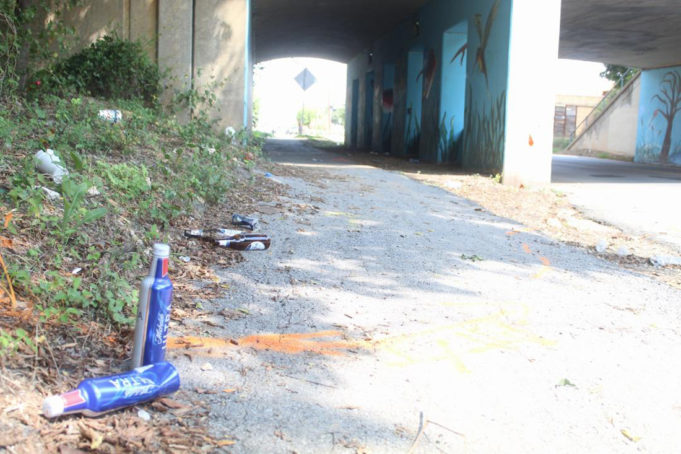When Robin Arena moved to the eastern edge of the West 7th corridor 11 years ago, she found a community that seemingly offered everything she wanted within walking distance. Her Parkside So7 Urban Apartments townhome placed her within minutes of the retail stores and white tablecloth restaurants on Crockett Street. Arena said she always felt safe walking to and from her home, even late into the evening.
A few years after her move into the mixed-use development is when Arena says her quality of life and that of her neighbors began taking a precipitous drop. The proliferation of bars along the streets just south of Crockett Row brought drunken revelers who would stumble into her residential neighborhood and make a ruckus at night. Illegally parked cars, an increase in panhandling, and excessive litter have become constant problems as well.
“The trash is ridiculous,” Arena continued. “We are paying our landscaping crews to clean up this mess. [West 7th bar customers] are coming to our neighborhood drunk. I used to be able to walk out the back gate and do it safely.”
To address parking woes, litter, and public safety concerns, among other issues, members of the West 7th Neighborhood Alliance are engaging City Councilmember Elizabeth Beck, city staff, and area business owners to develop and implement a strategic plan to improve livability for all residents in and around the West 7th corridor. Arena recently joined three members of the neighborhood alliance on a Zoom call to describe their efforts.
Neighborhood Alliance president Jill Freer said she is concerned about the quality of life near her Linwood neighborhood just west of Montgomery Plaza.
When the West 7th development idea “was born in the early 2000s, it was thought it would be a mixed-use neighborhood,” Freer said. “The vision was for a walkable design with a high-quality mix of residential, office, retail, and entertainment. Over the years, with the variances and unforeseen consequences of zoning, we have large concentrations of single uses like large apartment blocks with little retail, and we have a concentration of bars. It did not turn out as planned.”
Neighborhood Alliance vice president Margaret DeMoss, who lives in a Montgomery Plaza loft, said her community began to take a dive around 2018, and the city’s revamping of streets in and around Crockett Row has done little to fix parking shortages and publicly intoxicated pedestrians who flood Crockett Row and nearby bars on weekday evenings.
“The city did not regulate these bars,” DeMoss said. “The bar owners would take a small warehouse and add patios and a second story. Some of those buildings accommodate thousands of patrons. Where are they going to park? The city continues to pour money into the neighborhood by policing us more instead of addressing the root cause, which is too many bars in too small a location. This is a zoning problem. By right, these bars are able to move in there.”
To stem the influx of bars that the residents believe to be the underlying cause of West 7th’s problems, alliance members have drafted a four-part plan that would require support from city officials. The alliance members are calling for a moratorium on approvals of additional bars along the streets to the north, east, and south of Crockett Row. Members are also calling for the city to develop an overlay that would regulate where future bars could open in the mixed-use corridor. The third proposal is for the establishment of a task force of West 7th community stakeholders that would examine the extensive problems facing the West 7th corridor and make recommendations to Fort Worth City Council to resolve the issues. The last proposal is to spotlight bars that are the main source of overserving alcohol and not being good stewards of the area.
Freer said many locally owned West 7th bars want to solve the problems vexing her and other alliance members. The alliance president said the chain businesses, managed either from Dallas or out of state and responsible for most of the issues, appear less concerned about the problems. The three alliance members said they keep in close contact with several bar owners who also want to see improvements in the corridor.
The three homeowners said other developing neighborhoods in Fort Worth could learn from West 7th’s missteps. Districts like the Foundry District, River East, and elsewhere should consider zoning options carefully to ensure that developments maintain an even mix of residential, retail, office, and entertainment. Freer said her group is working with city officials to prevent the overcrowding of bars in any Fort Worth entertainment district.
Arena said developers and city officials were likely enamored with the profitability of Crockett Row and the bars and restaurants that opened nearby more than a decade ago.
“It was a bright, shiny object,” to them, she said. “I don’t think there was an understanding of the underlying instruction needed or the attention that needed to be paid along the way. The [West 7th community] has made a lot of money for the city. When you keep peeling back the layers, you see it’s not as bright and shiny as you thought it would be.”
This story is part of Inside West 7th, an ongoing series of reports on the past, present, and future of the area. Have news tips or ideas for us? Email Editor Anthony Mariani at Anthony@FWWeekly.com.












